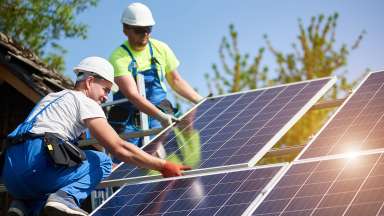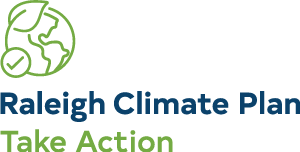Jump To:
The award-winning and nationally record-breaking Solarize the Triangle program helps homeowners, businesses, and nonprofits across the Triangle area obtain volume discounts on clean energy materials and installation services. That, in turn, helps them become more resilient, reduce energy expenses, and save on the cost of renewable energy systems.
The first phase of the Solarize the Triangle pilot program ran in 2022-2023. The program saw more than 2,000 participants and led to hundreds of new solar installations across the Triangle.
Currently, a second phase of the program is using federal funding to subsidize solar installations for residents who earn a low-to-moderate income.
Community Impact of Phase One
The community impact of the initial pilot program included:
- 321 contracts signed;
- $570,607 in annual utility bill savings;
- $10.92 million invested in clean energy development;
- 5.92 million pounds of CO2 emissions reduced annually;
- 3,155.3 kilowatts of new clean energy capacity; and,
- 4,389,291 kilowatt hours of annual energy production.
Phase Two: Solar Energy for Households With Low-to-Moderate Income
The City of Raleigh is using federal funding from the American Rescue Plan Act (ARPA) to subsidize and install solar systems for Raleigh residents who earn a low-to-moderate income (LMI). The Solarize the Triangle LMI program is the first of its kind.
These households often spend a large proportion of their income on energy costs. And while solar systems could significantly reduce energy bills, residents are often unable to invest in solar energy (and save money over time). The LMI pilot program aims to lower costs for these households and provide them with clean, affordable energy.
Programs like this one increase access to clean energy and contribute to a more equitable community. City of Raleigh Sustainability Director Megan Anderson emphasizes the program's dual benefits of reducing greenhouse gases and promoting equity. “Your bills are lower. You’re able to afford other things you need. So, there are a lot of reasons why this is a high-impact program and important to the community.”
Staff will explore opportunities for future initiatives after the pilot phase ends.
Looking Ahead
The pilot program is now closed for applications, but the success of Solarize the Triangle has paved the way for future efforts to increase access to clean and affordable energy. The City and our partners are committed to exploring new ways to promote solar and other clean technologies, particularly for low-to-moderate-income households and for those living in affordable housing. We are working to ensure that the benefits of renewable energy are accessible to all.
One such future opportunity is North Carolina’s Solar For All program. In April 2024, the U.S. Environmental Protection Agency awarded $156 million to North Carolina to support solar in low-income and disadvantaged communities. The City of Raleigh will collaborate with regional partners to inform the implementation of this program, and Raleigh’s LMI pilot program will provide valuable information to its design. This program is still under development.




